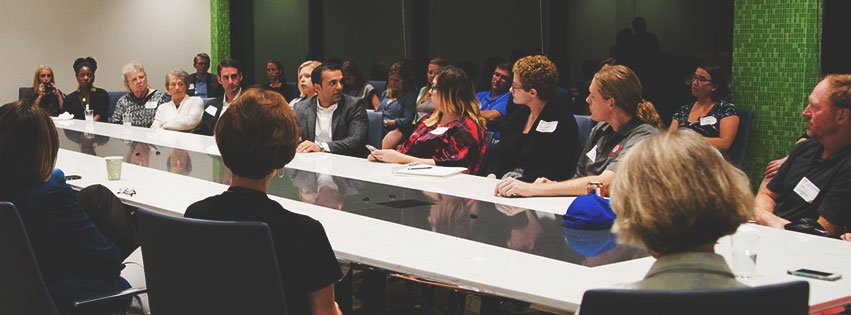

“Out of Your Mind” was a TEDxJacksonville Salon on mental health for the Northeast Florida community.
Out of Your Mind sold out in less than a week, proving that these conservations are critical and that Jacksonville is ready to eliminate the shame and silence that some still associate with mental health. Statistics on mental illness are imprecise, because millions who live with a mental health issue are never diagnosed or treated. National estimates, however, are sobering: • An estimated one in four adult Americans lives with a mental illness (approximately 61.5 million). • 4% of Americans live with a serious mental illness such as schizophrenia, major depression or bipolar disorder. • Approximately 46% of youth ages 13-18 either have a mental disorder of some type or have had one at some point in their lives; 21% of them have or have had a severe mental illness. For those ages 8-15, approximately. • 13% of Americans have experienced a mental disorder of some type. • Approximately 60% of adults and almost one-half of youth ages 8-15 with a mental disorder received no mental health services in the previous year. Admitted: A list shows the reasons given for having a patient moved to the asylum from 1864 to 1889. This list reveals inequality and a poor understanding of mental health issues in the 1800s. Although we have made great progress since then — there is still much more to be done.
Admitted: A list shows the reasons given for having a patient moved to the asylum from 1864 to 1889. This list reveals inequality and a poor understanding of mental health issues in the 1800s. Although we have made great progress since then — there is still much more to be done.
Childhood trauma isn’t something you just get over as you grow up. Pediatrician Nadine Burke Harris explains that the repeated stress of abuse, neglect and parents struggling with mental health or substance abuse issues has real, tangible effects on the development of the brain. Adverse Childhood Experiences (or ACEs) increase our risks of developing mental health issues such as depression and anxiety but also physical issues such as pulmonary disease and lung cancer. In a talk equal parts eloquent and devastating, we watched writer Andrew Solomon as he took us to the darkest corners of his mind during the years he battled depression. Today, thanks to better early detection, there are 63% fewer deaths from heart disease than there were just a few decades ago. Dr. Thomas Insel, who stepped down from his position Director of the National Institute of Mental Health on Sept. 15 after 13 years, wonders “Could we do the same for depression and schizophrenia?” Dr. Insel announced that he would be joining the Google Life Sciences team at Alphabet (formerly Google) and leading a new initiative that will focus on mental health.
 After viewing the talks everyone broke out into engaging discussion groups based on correlating topics. The evening’s discussion leaders included:
Dr. Shariq Refai led a discussion focusing on the prevention, diagnosis and treatment of mental, addictive and emotional disorders.
After viewing the talks everyone broke out into engaging discussion groups based on correlating topics. The evening’s discussion leaders included:
Dr. Shariq Refai led a discussion focusing on the prevention, diagnosis and treatment of mental, addictive and emotional disorders.
“The TEDxJacksonville salon on mental illness allows us the ability to destigmatize mental illness in the community.” — Dr. Shariq Refai, Psychiatrist, Baptist Health, discussion leaderDr. Steven Cuffe led a discussion focusing on his research on the prevalence and treatment of mental disorders in children.
“Working at an agency that serves individuals with disabilities, you see high ratio of people with mental illness. Sometimes there’s an unnecessary stigma to Mental Illness; so it’s not discussed enough. Talks like these make conversation easier.” —Tyler Morris, Director of Marketing and Development, The ILRC, discussion participantDr. Terrie Andrews led a discussion on mental health in children. She has created training platforms that help guide parents through a thorough assessment of a child’s development. Her experience in the school system helps parents navigate school policies and procedures.sment of a child’s development. Her experience in the school system helps parents navigate through school policies and procedures.
“Mental Health is such an important discussion; I would have loved to be in all the sessions. Everyone had important things to say. Silence is the problem, especially people who attempt self-diagnosis [from not having a safe environment to talk about issues].” — Jill Auld, Manager, PACE Center for Girls, discussion participant
“Opportunities are available to support students in both general education classrooms and within specialized program settings in the district. At the most basic level, community members with a willingness to provide social-emotional support and a caring presence may volunteer in classrooms as an aide. Volunteers willing to participate in some additional training, provided by DCPS, could conduct social skills lessons with students. Placements for the above opportunities would be made based on the volunteer’s preferences related to geographical location, age group, and/or type of classroom setting. Finally, any suggestions for additional support are welcome and encouraged.” — Susan Leach, M. Ed., CAGS, Supervisor, School Psychology & School Social Work, Duval County Public SchoolsHelp us create more events like “Out of Your Mind” and keep the conversations going!
 Author: Becka Lee Gruber
Author: Becka Lee Gruber





